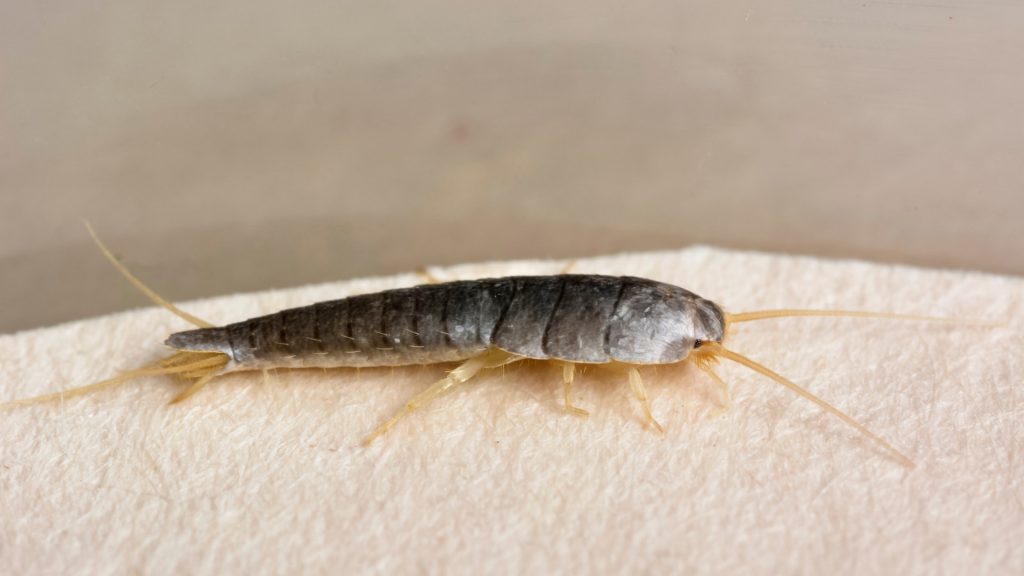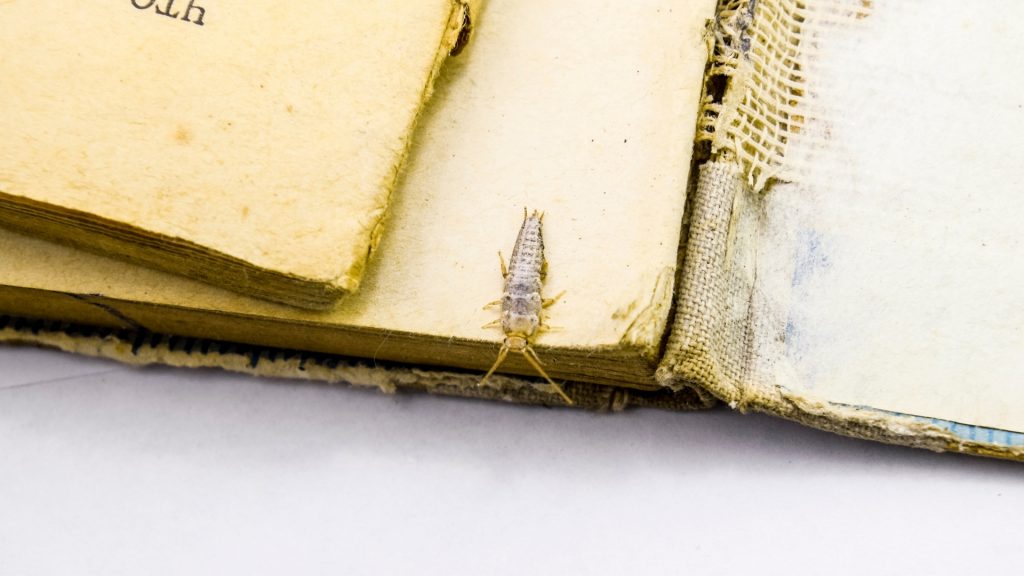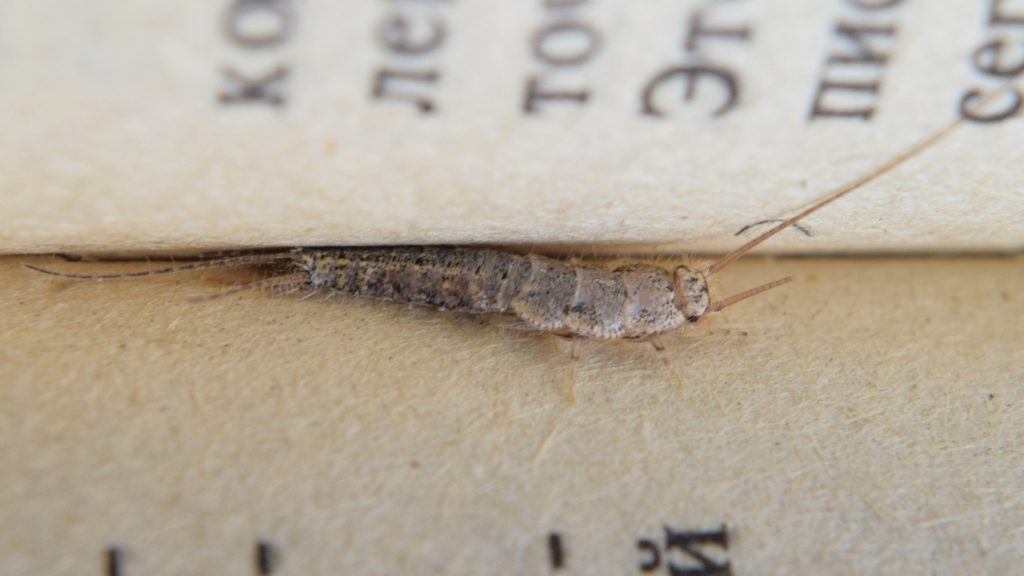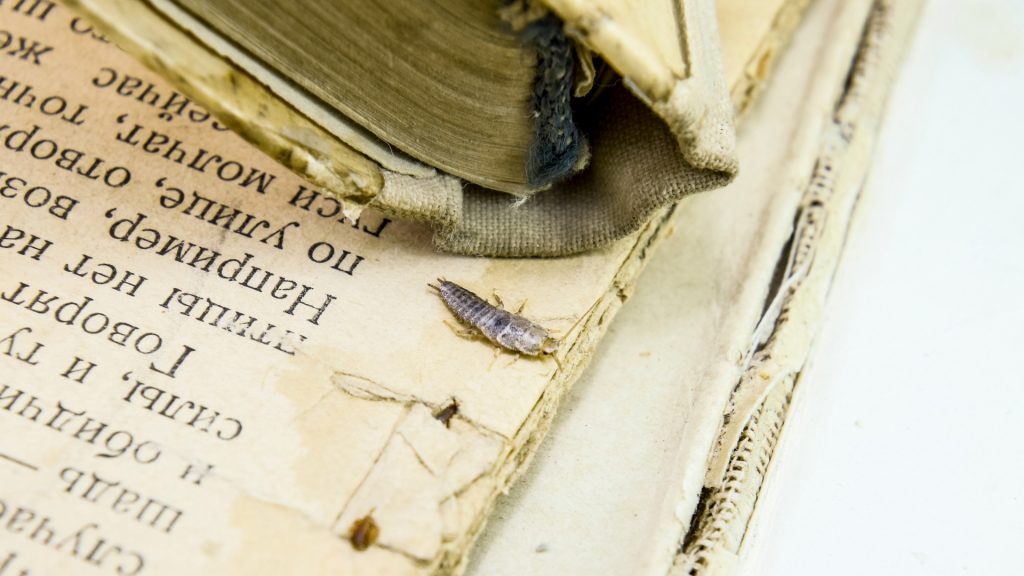Silverfish are creepy-looking wingless pests that can infest your home. These insects are often mistaken as centipedes, firebrats, and booklice.
Do silverfish bite? Silverfish don’t bite people. However, they can trigger allergies, leave scrapings on your wallpapers, paper items, bookbinding, and fabrics. They often leave holes and discoloration in and along the edges of the materials they’re targeting.
Thus, when you see holes and discoloration of your fabrics, books, and other paper items, chances are silverfish have already invaded your space. They can enter your house through cracks, gaps, and holes in your building’s exterior.
This is why it’s crucial to exterminate these pests promptly before they can damage your possessions and the foundation of your home.
But, what is silverfish, and how can you deal with them? You can have the answers to these questions below.
Silverfish in a Nutshell

| Name | Scientific Name | Color | Size | Legs | Shape | Antennae |
| Silverfish | Lepisma saccharina (Linnaeus) | Silver to brown | ¾ inches | 6 | Oval or elongated | 2 |
Silverfish are small, fish-like-looking creatures with a metallic appearance and fish-like movements. They’re also known as ‘bristletails’ due to their bristle-like tails found on the back end of their body.
These pests can be found throughout the United States and are typically spotted in the following areas:
- Basements
- Bathrooms
- Humid areas at home
- Attics
You might find it hard to spot them in your place as they hide their presence to humans pretty well. Thus, if you’re not too observant of the conditions of your possessions, the damages they have caused might go unnoticed.
They’re mostly active by night and feed on a wide array of household items such as:
- Wallpapers
- Books
- Documents
- Photographs and more
They’re common in places where papers and books are abundant, like in the museums and libraries. They can also be spotted under the rocks, inside the caves, ant nests, and leaf litter.
When it comes to the description of their bodies, the silverfish have long bodies, which are about 12 to 19 millimeters. Their fish-like bodies have six legs and two antennae.
You can also notice in them the following features:
- Flattened body
- Teardrop, fish, or carrot-like body shape covered with scales
- Metallic appearance
- Thread-like antennas
- Widely separated, small eyes
Signs of Silverfish Infestation

Although silverfish aren’t considered dangerous to humans, they can cause property damages and allergies to some people. They can also attract other moist-loving pests like termites and earwigs that can cause significant damage to your home.
Thus, it’s essential to notice their presence and take action right away before they can damage your belongings. However, if you’ve seen the following signs, find ways to manage them right away, or better yet, call your local pest control expert.
Yellow Stains
You can identify that silverfish have been in your place if you’ve seen yellow stains in your books, papers, and fabrics. They often leave this yellowish dust whenever they shed skins, causing stains on some of your things.
Black Pepper-Like Pellets (Feces)
Another sign is seeing the black pepper-like pellets, which are the feces of silverfish. Because their droppings are unique, you can quickly distinguish them from others.
Their feces resemble the small, black peppercorns and are frequently found in garages, kitchens, storage areas, and basements. If not thorough enough, you might miss their droppings or label them aside as debris or specks of dust.
Noticing Some Shed Skins
Throughout the life cycle of silverfish, they shed some skin. Thus, if you see some shed skins in your attics, basements, and other spaces, silverfish could be invading your home.
Property Damages
If you’re a lover of books, or your house is full of documents, you could suffer significant damages. These pests love to nibble books, papers, and other things such as wallpapers, adhesives, starches, and sugars.
They won’t also skip nibbling your linens, given the opportunity. Thus, if you see any holes in your house items, like books and fabrics, the silverfish could be infesting your home.
Seeing Silverfish With Your Own Eyes

Another sure sign of silverfish activities in your house is by spotting them with your very own eyes. They’re wingless pests and have small, flexible, scaly bodies.
You can also identify them with their fish-like movements and brown-gray or bluish silver color.
Truth About Silverfish

Silverfish are nuisances. They can cause several damages to your property by eating and creating holes in them.
You can typically find these damages in books, wallpapers, fabric, and more. They can also attract other pests that are more damaging than them like termites.
Thus, it’s crucial to get rid of them right away if you start to notice their presence in your house. According to the National Pest Management Association, you’re under infestation if you start to notice the yellow stains, property damages, shed skins, among others.
It’s also been studied that a person with an allergy to silverfish could experience respiratory symptoms. The shed skins of silverfish have tropomyosin, which is a protein that can be combined with other allergens, causing allergic reactions.
These pests can also contaminate your foods like meat, flour, and other carbohydrate-rich foods. So, it’s essential to control their activities within your premises at all costs.
Related: What Do Silverfish Eat? | Information and Facts
How to Get Rid of Silverfish?
There are three ways you can get rid of silverfish in your home. One is by using chemicals, the other is through natural methods, and the remaining one is by hiring a licensed pest control professional to do the job for you.
The Natural Way
The natural way of exterminating silverfish from your house is by the following means:
Reduce Humidity and Moisture
Reduce the humidity and moisture amount in the area where the silverfish is living. You can do this by opening vents in crawl spaces and using baseboards with caulking in basements.
Use Air Conditioning, Dehumidifiers, or Fans
You can use air conditioning, dehumidifiers, or fans in areas where you’ve stashed your books. It will also highly help to repair the plumbing leaks to cut off the water sources of these pests.
Clean up Dark, Hidden Spaces
One of the ways to get rid of silverfish naturally is through clearing up the dark, hidden spaces. This will reduce the places where they can live.
Use Cloves, Cedar Shavings, DE, and More
You may also use cedar oil and water, cedar shavings, cloves, and cinnamon as an effective repellent of silverfish. To control a small infestation, you can also apply Diatomaceous earth (DE) to the affected area.
Diatomaceous earth is a fossilized algae-made powder that dehydrates and eventually kills silverfish when they ingest it. They’re safe for pets and humans, so it’s essentially safe for everyone, except for these pests.
- 100% Chemical-Free: Made from 10lbs of food-grade freshwater...
- OMRI Listed for Organic Use: Listed with the Organic Materials...
- Powder Duster Included for Easy Application: Comes with a powder...
- Sourced and Packaged in the USA: Responsibly mined in Nevada and...
- Multi-Purpose Use Indoors and Outdoors
Traps or Baits
You can also set up traps to get rid of these nuisances. However, traps that involve the use of boric acid can be harmful to pets and humans. Thus, careful application is advised.
- POWERFUL INDOOR CONTROL: Greenway spider and silverfish traps use...
- SAFE FOR HOMES WITH PETS AND CHILDREN: Made with non-toxic...
- VERSATILE AND EASY TO USE: Just peel the paper strip to expose...
- LONG-LASTING: These indoor insect traps deliver up to 2 months of...
- COMPLETE COVERAGE: Each pack includes 6 sticky paper traps for...
The Use of Chemicals
Since silverfish can be picky with their baits, trapping or baiting won’t typically work on these pests. Thus, the use of chemicals is needed to exterminate them effectively.
However, it’s better to know that the use of insecticides is ideal only for large infestations. Choose sprays with cyfluthrin, tetramethrin, synergized pyrethrin, and bifenthrin components, as they’re said to be effective against silverfish.
Make sure to use these chemicals with caution and always follow the manufacturer’s instructions to ensure safety. Never use these chemicals near food storages, faucets, and other places where children and pets are playing.
Hiring a Pest Control Professional
If the silverfish presence in your home is more than you expected, it’s best to call your local pest control professional to do the job. This way, you can guarantee that the infestation will be dealt with effectively.

To avoid the hassle of getting rid of these pests, it’s best to do some prevention by reducing the moisture in your areas. Look for plumbing issues and repair them right away to solve your moist problems.
You can also start clearing up your spaces and put air conditioning or fans in places where you put your books and documents. This way, you can ensure that your paper valuables are safe from the attacks of silverfish.
Related: How To Get Rid of Silverfish? | Top 11 Silverfish Repellents
List of Sources
Raulf, M., et al. (2015). Mites and other indoor allergens — from exposure to sensitization and treatment. Allergo Journal International.
Phillips, E. F., Gillett-Kaufman, J. L. (2018). Silverfish – Lepisma saccharina. University of Florida.
Rust, M. K., Millard, M. R. (2009). Silverfish and Firebrats. University of California.
- How to Get Rid of Copperheads | Practical Guide - August 27, 2023
- How to Get Rid of Corn Snakes | What Makes Them Aggressive? - August 27, 2023
- How to Get Rid of Alligators | Safety Measures and Removal Methods - July 16, 2023



